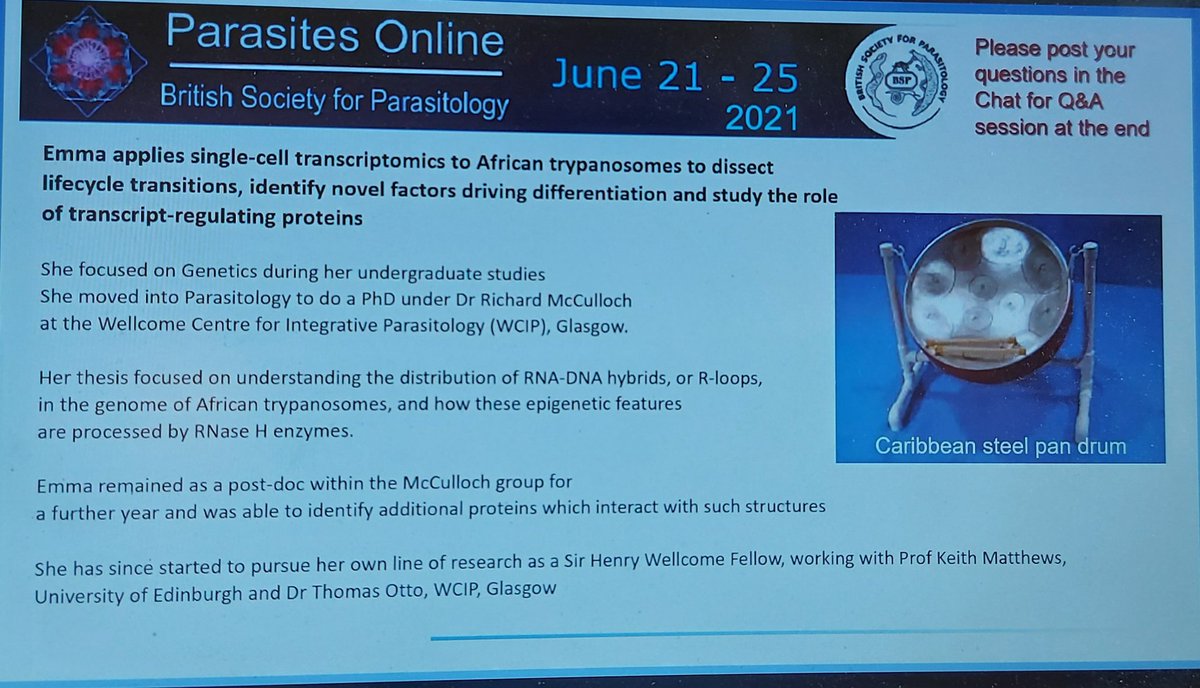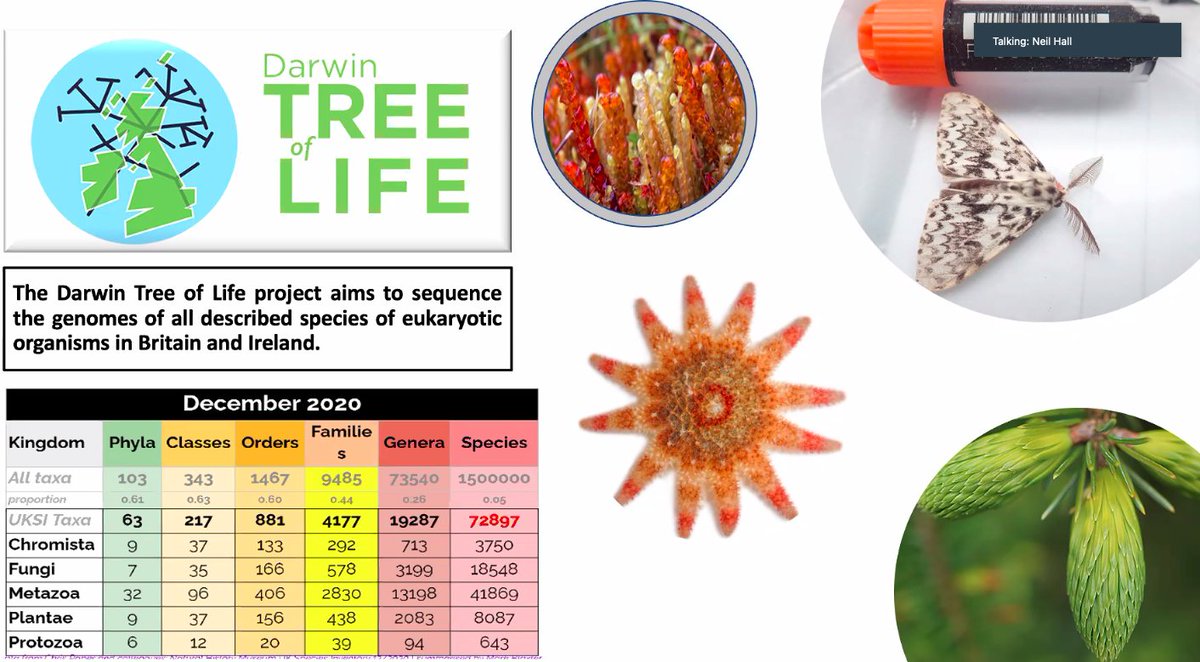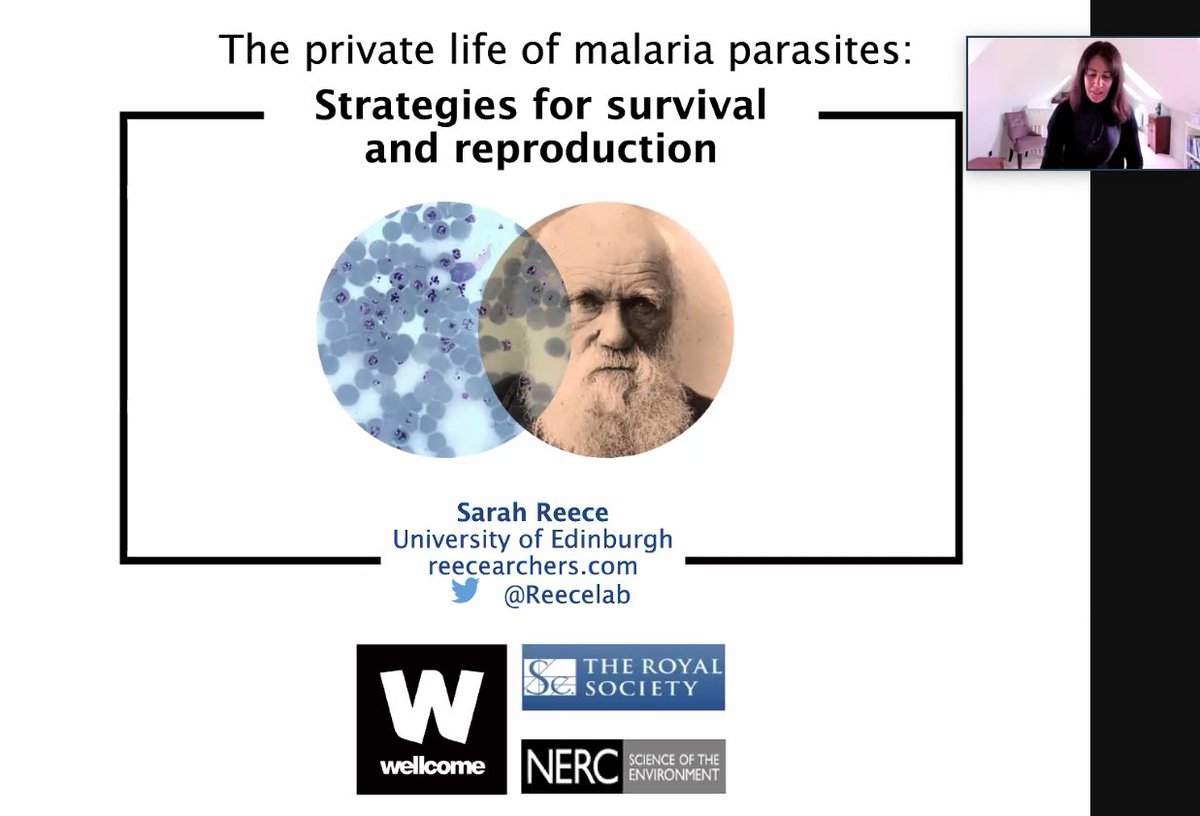
Our 5th and final day of #ParasitesOnline21 will begin shortly with a plenary talk from Prof Santiago Mas-Coma from University of Valencia on: Fascioliasis control in human endemic areas: one health action to complement preventative chemotherapy
Prof Maria-Gloria Basanez introduces Prof Santiago Mas-Coma who was awarded Honorary membership of @BSPparasitology in 2020 



Prof Mas-Coma cites his recent paper, which describes this One Health approach to tackle fascioloiasis spread by donkeys, which are important for transport in the Altiplano: ncbi.nlm.nih.gov/pmc/articles/P… Sheep & cattle also act as reservoirs: ncbi.nlm.nih.gov/pmc/articles/P… #ParasitesOnline21
4 animals act as reservoirs for human fascioliasis transmission in the Northern Bolivian Altiplano: cattle, sheep, donkeys, & domestic pigs. However, llamas & alpacas are a transmission "dead end" because of defaecation habits of these animals: dung piles away from water sources!
You can find another recent & comprehensive review of human fascioliasis from Prof Mas-Coma at cambridge.org/core/journals/… #ParasitesOnline21
Very interesting question about the camelids (such as alpacas & llamas). Camelids produce unique heavy chain IgG antibodies (IgGs composed of ONLY 2 heavy chains). Could this be responsible for the fact that camelids don't act as reservoirs for human Fasciola infection?
Prof Mas-Coma said that this may be a factor but we don't know definitively yet. Here is a great review with an historical perspective at ncbi.nlm.nih.gov/pmc/articles/P…
And now we have a 30 min @BSPparasitology AGM before 3 parallel sessions:
1. Drugs, Vaccines and Disease Control III
2. Schistosomiasis - Control, epidemiology and One Health II
3. @WBParaSite Workshop
Lots to choose from! #ParasitesOnline21
1. Drugs, Vaccines and Disease Control III
2. Schistosomiasis - Control, epidemiology and One Health II
3. @WBParaSite Workshop
Lots to choose from! #ParasitesOnline21
One important take-away from Prof Basañez' President's Address to the @BSPparasitology AGM: when we can safely go back to in-person meetings, there will be childcare provisions for conference participants! #ParasitesOnline21 @WiParasitology @womeninmalaria
And make sure to let your #Parasitology ECRs know about this #SBPz Event for Early Career Researchers from 28-29th August, 2021. Featuring @CCattaPreta, @Jquintanalcala, @schisto_tom, @jezielbqi, & more! More info from the #SBPz at sbpz.org.br #ParasitesOnline21 

And now we begin our #ParasitesOnline21 "Drugs, Vaccines and Disease Control III" session with Prof Achim Hoerauf from @DZIF_ in Germay with "Development of macrofilaricidal drugs for #onchocerciasis and lymphatic #filariasis." #parasitology 
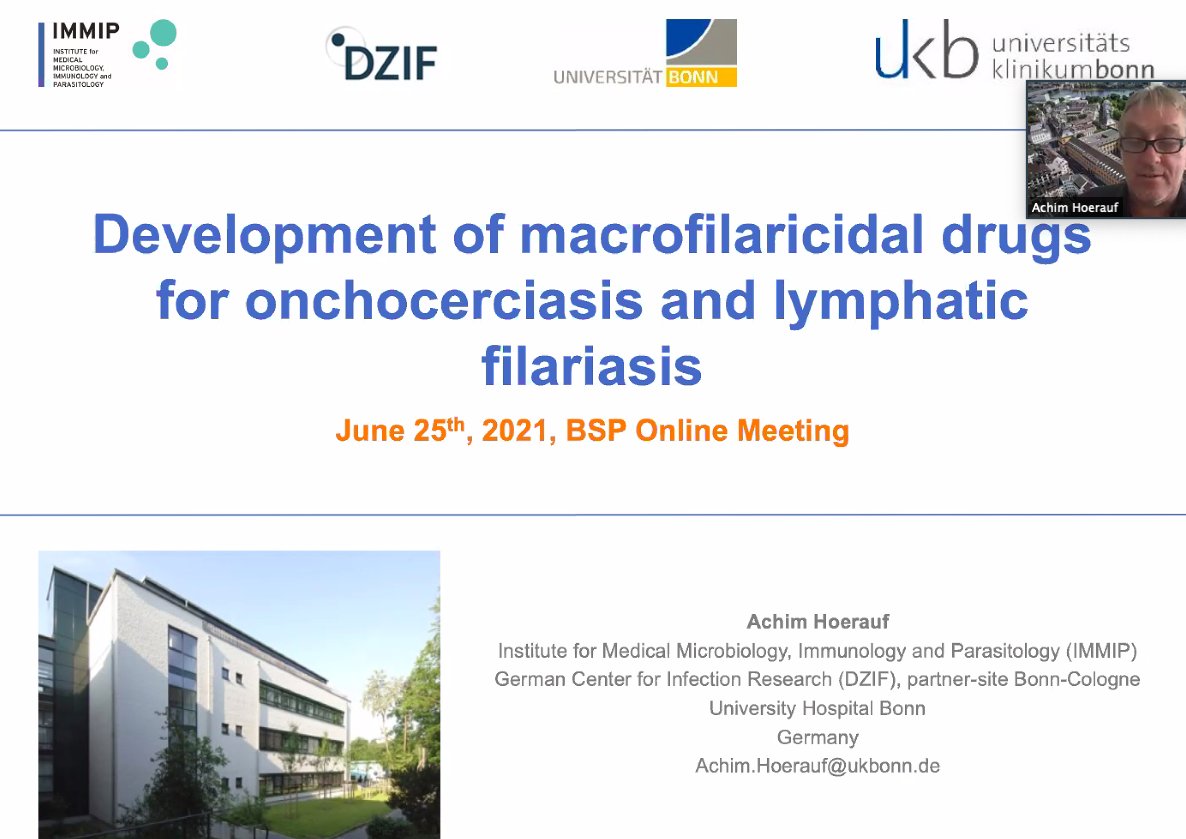
In the London Declaration on Neglected Tropical Diseases (2012), the aim was to end 4 #NTDs, including African trypanosomiasis and lymphatic filariasis by 2020! However, we now have a new roadmap for 2021-2030 which you can read about at journals.plos.org/plosntds/artic… #ParasitesOnline21
Prof Hoerauf cites years of research into the treatment of #onchocerciasis such as in link.springer.com/article/10.100… and ncbi.nlm.nih.gov/pmc/articles/P… #ParasitesOnline21
Prof Hoerauf describes the anti-Wolbachia consortium (A-WOL) (now in version "A-WOL II") & you can read a little about A-WOL at journals.sagepub.com/doi/full/10.11… #ParasitesOnline21
Now Prof Hoerauf discusses some potential new chemotherapeutics such as stm.sciencemag.org/content/11/483… However, there are more in the @DNDi pipeline! #ParasitesOnline21
Prof Hoerauf also speaks about the potential use of deep learning for histology of #onchocersiasis ("AI oncho") & you can read about it's development at covid19innovationhub.org/innovation/dee… #ParasitesOnline21
And now we have talk 2 of our "Drugs, Vaccines and Disease Control III" session: Dr Ashwani Sharma of @psich_en with "Towards the Structure Based Design of Broad Spectrum Anti-Apicomplexan Drugs." #ParasitesOnline21 

Dr Sharma describes the establishment of tubulin as a drug target in Apicomplexa, showing a comparison of tubulin crystal structures between humans and protozoa. Could a microtubule targeting agent (MTA) be redesigned as an anti-protozoal drug? e.g. mdpi.com/1422-0067/18/7…
So keep an eye out for a publication from Dr Sharma in future about "parabulin"! #Apicomplexa #ParasitesOnline21
And now a "Drugs, Vaccines and Disease Control III" talk from our new BSP President, Dr Colin Sutherland of @LSHTM_malaria, who will tell us about "ACT treatment failure and resistance gene variants in African #Plasmodium falciparum." #ParasitesOnline21 

Dr Sutherland cites the original Kelch13 publication, identifying it's role in artemisinin resistance in #Plasmodium falciparum: nature.com/articles/natur… And a new paper under review now showing a qPCR-based protocol for investigating artemisinin susceptibility in field studies.
Dr Sutherland discusses a new paper that just came out this month at europepmc.org/article/med/34… and now moves into a description of the Pfcoronin gene, which also modulates artemisinin susceptibility: pnas.org/content/115/50…
The adaptin subunit AP-2mu is now discussed (ncbi.nlm.nih.gov/pmc/articles/P…), with the Sutherland Lab examining it's role in ring-stage #Plasmodium susceptibility to artemisinin: journals.asm.org/doi/full/10.11…
And now for our final #ParasitesOnline21 talk of the "Drugs, Vaccines and Disease Control III" session: Ben Jones of @UniOfSurrey with "Disentangling the role of #Ascaris β-tubulin isotypes in the emergence of anthelmintic resistance." #parasitology 
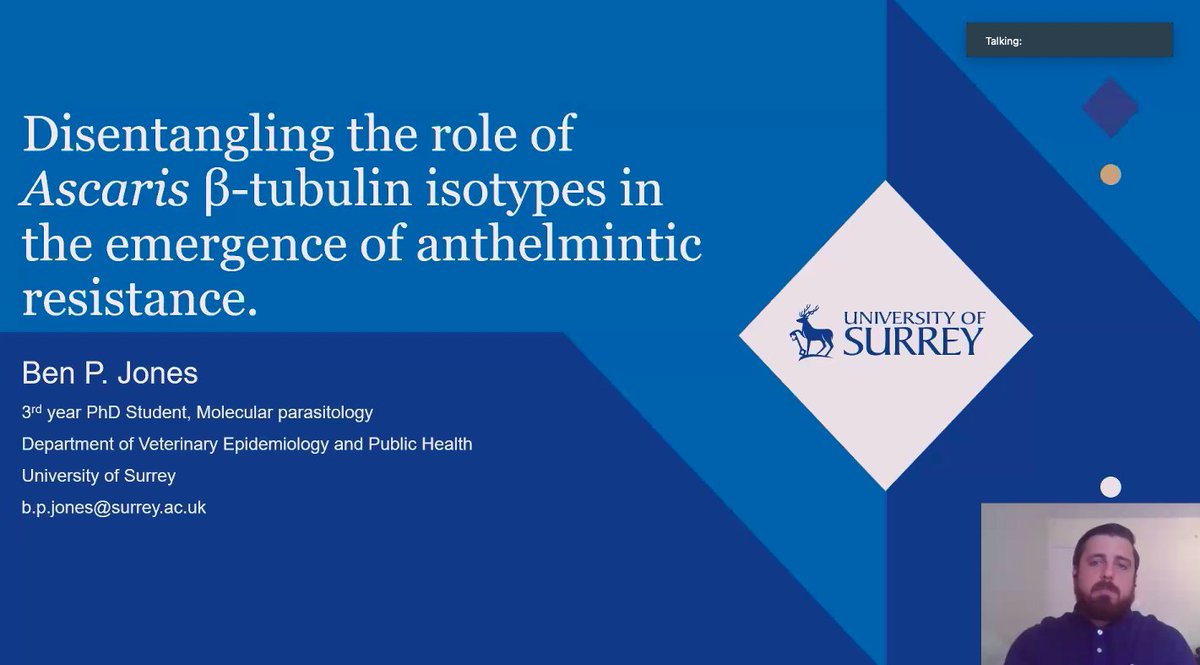
Ben Jones describes the efficacy of benzimidazoles in treating #Acscaris infections, but tells us that mass drug administration (MDA) creates the potential for benzimidazole resistance. Ben cites a case of this in human infections already: ncbi.nlm.nih.gov/pmc/articles/P…
Ben describes his PhD work in mapping the genetic diversity of #Ascaris beta-tubulin, showing in silico docking experiments to examine beta-tubulin protein-drug interactions & potential effects of SNPs in resistance. Great work to look out for from Ben!: surrey.ac.uk/people/ben-jon…
And now we have our first talk of the #ParasitesOnline21 "Epidemiology, Stigma and Public Health I" session with Prof Maria-Gloria Basanez of @imperialcollege with "Mathematical modelling and the WHO 2021-2030 roadmap on neglected tropical diseases: Insights and challenges." 

Prof Basáñez describes the @WHO Sustainable Development Goals which include aims to eliminate certain #NTDs as public health problems by 2030: who.int/health-topics/… #ParasitesOnline21
Prof Basáñez tells us about the five principles of the #NTD modelling consortium journals.plos.org/plosntds/artic… and cites some of the lab's models for elimination goals of #NTDs such as #Chagas disease: ncbi.nlm.nih.gov/pmc/articles/P…
Prof Basáñez now details the lab's modelling work for #Taenia solium gatesopenresearch.org/articles/3-1546 & shows some recent work in determining the "force-of-infection" of porcine #cysticercosis at nature.com/articles/s4159… #ParasitesOnline21
You can also find recent modelling work from the Basáñez Lab into #onchocerciasis treatment decision making at academic.oup.com/cid/article/72… And the lab also assessed the effect of COVID-19 on onchocerciasis control & elimination at academic.oup.com/trstmh/article…
And now to expand on the #Taenia solium work of the Basáñez Lab during talk 2: Dr Matthew Dixon-Zegeye of @imperialcollege with "Force of infection and age-profiles of Taenia solium human taeniasis and #cysticercosis: global trends and subnational analysis for Colombia". 

As referenced above in the thread about Prof Basáñez' talk, @DrMattDZ's force-of-infection work is out at nature.com/articles/s4159…, building on, & adding to, the EPICYST transmission model, the original paper of which is at parasitesandvectors.biomedcentral.com/articles/10.11…
And now for our 3rd & final "Surveillance, Epidemiology, Stigma and Public Health I" talk: Dr Kezia Whatley of @UniOfSurrey who tells us about "ZooTRIP: Zoonotic transmission of intestinal #parasites: implications for control and elimination." #ParasitesOnline21 

Dr Whatley describes the establishment of a molecular biology laboratory at the University of Los Baños in the Philippines for the ZooTRIP project, with great support from @UniOfSurrey. You can read more about it at gtr.ukri.org/projects?ref=M… and uplb.edu.ph/all-news/uplb-…
And Dr Whatley did mention that the ZooTRIP project is looking for someone with experience, I think mainly in sequencing/Bioinformatics, to join the project for at least a few months so her details are at surrey.ac.uk/people/kezia-w…
• • •
Missing some Tweet in this thread? You can try to
force a refresh




